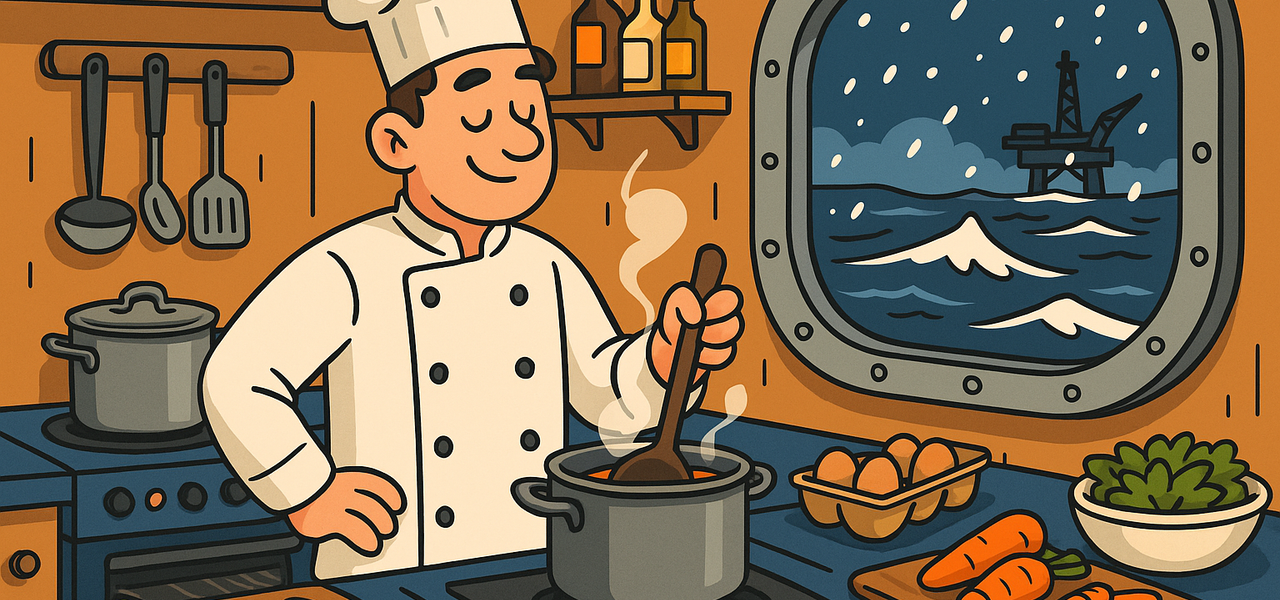For many UK chefs, winter is a time to think about what kind of routine they really want. While some kitchens get busier and more demanding, offshore chef roles offer something different. They bring structure, focus, and a sense of calm away from the noise of city restaurants.
Chef jobs offshore are not for everyone, but for those who like consistency, teamwork, and predictable schedules, they can be a welcome change. Winter conditions bring extra challenges, from supply delays to icy weather, but they also add to the sense of rhythm that many chefs enjoy once they adapt. Knowing what to expect before heading out helps you prepare for both the rewards and realities of life offshore.
Adapting to Offshore Life in the Cold
Working offshore in winter is unlike anything in a traditional restaurant setting. The cold affects everything from daily routines to how ingredients are managed.
Here’s what you can expect:
- Temperatures drop sharply, especially on deck. Tasks such as unloading supplies or waste disposal take longer and require extra care on slippery walkways.
- Transport to offshore sites can be delayed by storms or strong winds, which means travel plans are often flexible.
- Stock management becomes critical. If a delivery is missed due to bad weather, chefs rely on clever planning and well-stocked dry stores to keep meals running smoothly.
For many, the hardest part is not the cold but the timing. Being offshore during festive periods like Christmas or New Year can feel isolating. Yet for others, the peacefulness and focus of that environment make it a rewarding way to spend the season.
Understanding Offshore Work Schedules
Offshore kitchens typically operate on a rotation schedule, regardless of the season. The most common pattern is two weeks on and two weeks off, although this varies between employers.
A few key things to know:
- Weather delays can occasionally affect rotation timing. You may start your break later if transport is postponed.
- Shifts are structured and repetitive, which many chefs find grounding once they settle in.
- During the holidays, additional kitchen staff may be brought in to spread the workload and maintain morale.
The benefit of this system is clear: when you are off duty, you are completely off. The long breaks between rotations allow chefs to rest, travel, or focus on personal goals.
Food and Menu Planning During Winter
Feeding a crew offshore is one of the most important parts of the job. During winter, energy-rich, warming food becomes essential for both comfort and morale.
Typical winter meal plans include:
- Hearty stews, curries, casseroles, and roast dinners that provide warmth and calories.
- Simple but filling dishes using ingredients that store well. Fresh produce can run low if supply deliveries are delayed by bad weather.
- Smart use of frozen and tinned goods to keep menus varied and satisfying.
Chefs offshore learn to be resourceful. The focus is less on presentation and more on consistency, flavour, and nutrition. A well-cooked meal can make a huge difference to the crew’s energy and outlook on long, cold days.
Skills That Make a Great Offshore Chef
Not every chef thrives in an offshore environment, especially during winter. The most successful ones share a few key traits that help them manage both the work and the lifestyle.
Top skills for winter offshore work include:
- Adaptability: Weather changes, supply issues, and travel delays are common. Staying calm and flexible is essential.
- Planning and organisation: With limited storage and infrequent deliveries, good prep habits are critical.
- Resilience and independence: Offshore life can be quiet at times, particularly during holidays. Chefs need to be comfortable with solitude and focused on their work.
Chefs who enjoy structure often find offshore work deeply satisfying. You know your responsibilities, you work within clear systems, and you get long breaks to recover and recharge.
Long-Term Benefits of Offshore Chef Work
Spending the winter offshore might sound demanding, but it can be a strong career move. Many chefs find that these jobs build discipline, leadership, and time-management skills that translate well to any kitchen setting.
The consistent routine also gives you space to focus on the fundamentals of cooking without the constant rush of front-of-house service. Some chefs use their rotation time off to study, explore new techniques, or take short culinary courses. Others enjoy the balance of intense work followed by long rest periods back home.
Offshore work may not suit everyone, but for chefs seeking stability and focus during the winter, it offers a professional rhythm that few other environments match.
Explore Offshore Chef Vacancies with Only Chefs
If you are considering an offshore role this winter, preparation is key. The work is steady, structured, and rewarding for the right person. You will need strong prep skills, a flexible mindset, and the ability to handle routine work away from home.
Only Chefs lists current offshore chef vacancies across the UK and beyond. Each role includes clear details about rotation schedules, working conditions, and expectations, helping you decide if offshore life is right for you.
Take the next step toward a more balanced and predictable chef career. Browse current offshore chef jobs on Only Chefs and find opportunities that align with your goals this winter.

